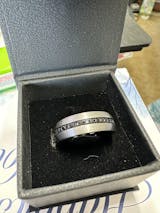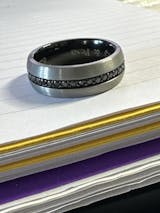
One of the most important things to focus on when buying a wedding ring is durability. After all, this is a piece of jewelry you will wear for many years to come. But before you decide to buy your wedding ring, you should know more about the differences between various types of materials. While there are many durable mens wedding bands currently available, every material has its own pros and cons.
Here you can find out about the advantages and disadvantages of several ring options, from titanium and tungsten to gold, silver, and platinum.
PLATINUM
Among the most durable mens wedding bands, platinum rings stand out with their longevity. Stronger and denser than gold, platinum is long-lasting and will keep its white color for years to come, even a lifetime. The density of the material ensures that any prong setting will be more secure over time compared to a prong setting of a gold ring. Platinum is 95% pure, it doesn’t tarnish, and it’s also hypoallergenic.
More expensive than gold due to its rarity, platinum is also denser. This means that jewelers have to use more material to make a platinum wedding band. Platinum’s 95% purity is also superior to a 14K gold ring, which contains around 58% gold. All of these features make platinum wedding bands less affordable than other rings.
Even though it’s stronger than gold, platinum is softer and scratches a bit more easily. However, scratches on a platinum ring appear differently than on other metals, looking like patina on an antique ring. Re-polishing the ring will restore it to its original appearance.
GOLD
Gold is a classic choice and it’s still one of the most popular metals for wedding rings. It’s also a good option for anyone looking for durable mens wedding bands. Gold has been a symbol of wealth for thousands of years, with gold jewelry from ancient civilizations surviving to this day. It’s a favored material especially for traditional styles.
This popular metal has a warm color which doesn’t fade. Gold will never tarnish, corrode, or rust, keeping its rich yellow color over decades of wear. Less dense than platinum, gold is easier to work with and can be used to design more intricate styles. White gold also offers a more affordable alternative to platinum rings.
Gold has several disadvantages. 24K gold is pure (it contains 100% gold), but it’s also too soft. 14K and 18K gold rings are stronger as they are made with gold alloys which contain metals such as nickel, copper, zinc, or silver. As a result, people who are allergic to metal can’t wear these types of rings. Gold wedding bands also scratch more easily and they bend on impact or under pressure.
STERLING SILVER
A precious metal, silver has a light gray color with a luminous sheen. In a similar way to gold, pure silver is too soft and would bend too easily with use. To strengthen it, jewelers use other metals to create a silver alloy. The highest quality silver is called ‘sterling silver’ and it’s also known as 925 silver. This refers to the percentage of pure silver in the alloy: 92.5% silver to 7.5% other metals.
Silver rings are more affordable than gold or platinum. Their malleability also allows jewelers to create intricate designs.
Grooms-to-be who want to buy durable mens wedding bands should keep several things in mind before choosing a silver ring. Silver is one of the softest jewelry metals and will scratch more easily than titanium or tungsten rings. Wedding bands and especially thinner rings may also bend under impact or pressure.
Since it is made with other metals, sterling silver will tarnish over time. Rings may develop a greenish or black hue, but this tarnish can be cleaned easily. Removing silver rings when cleaning, swimming, or washing dishes can reduce the speed of the tarnishing process.
Those who work in environments with exposure to higher temperatures or electricity should avoid buying silver wedding bands, as silver has a high conductivity for electricity and heat.
TITANIUM
Strong and lightweight at the same time, titanium is a popular choice for those who want to buy durable mens wedding bands.
Titanium has several advantages compared to gold or silver. It’s hypoallergenic, providing a good alternative to people who are allergic to metal jewelry. Resistant to scratches and impact, titanium is suitable for everyday wear. Titanium is also resistant to corrosion, which means that it’s not affected by the damaging effects of the sun, the elements, or corrosive materials.
The material’s low thermal conductivity means that titanium rings are resistant to changes in temperature. Titanium doesn’t rust and it doesn’t require maintenance. Finally, titanium wedding bands are more affordable than platinum or gold rings.
Available styles include anything from wood inlays and opal inlays to wave patterns with diamonds.
What are the cons of choosing a titanium ring? Titanium can’t be soldered or resized, requiring an accurate ring finger measurement. Due to the manufacturing process of titanium rings, adding a prong setting is incredibly difficult, although not impossible. It’s something to keep in mind for those who want a more traditional design, for example a ring with a diamond setting. As it features a matte surface, titanium lacks the shine of a platinum or gold ring.
TUNGSTEN
Compared to gold, platinum, or silver, tungsten is a fairly new material in the jewelry industry. But tungsten rings have become increasingly more popular over the years thanks to their strength and longevity. Tungsten rings are also cheaper than gold and platinum. When it comes to durable mens wedding bands, tungsten rings provide a good combination of durability, quality, and affordability.
Tungsten is one of the hardest materials in the world and has a higher tensile strength than titanium and steel. To make this hard metal easier to work with, jewelers use a compound material that combines tungsten and carbon atoms along with a binder. This process maintains the properties of tungsten intact, including the tensile strength and durability. Tungsten carbide rings don’t bend, never rust or tarnish, and have a high melting point.
Plain tungsten wedding bands are more scratch-resistant than colored versions. Available styles range from classic domed styles and rose gold finishes to modern rings with bright inlays, vibrant colors, or intricate patterns.
Unlike titanium, these rings are heavier in weight than Titanium, Gold and Silver for example. This ring is a favorite for mechanics and carpenters as well as others who work with their hands.
Just like titanium and ceramic, tungsten rings can’t be resized. Not naturally as white as platinum, due to its hardness, Tungsten carbide rings don’t bend, but breaks if enough force is applied.
CERAMIC
Ceramic wedding bands have grown in popularity in the last few years as they provide a good balance between modern style, durability, and price.
Lightweight but strong and long-lasting, ceramic provides a convenient solution to make durable wedding bands. Their lighter weight makes ceramic rings more comfortable to wear daily. At the same time, ceramic is strong enough to withstand scratches and scrapes without showing signs of damage like silver or gold. The intense black color will not fade over time, which means that ceramic wedding bands will look like new for longer.
Since it doesn’t contain nickel or other metals, ceramic is hypoallergenic. Ceramic rings are a good option for those who are allergic to metal rings.
Available in a range of styles, ceramic wedding bands usually feature eye-catching inlays like opal or luxurious wood. Because of this, they are preferred by those who want a more contemporary and creative wedding band.
A disadvantage of ceramic rings is that they can’t be resized. Measuring the ring finger accurately is important when buying a ceramic wedding band, but some retailers offer replacements for rings that don’t fit just right.





